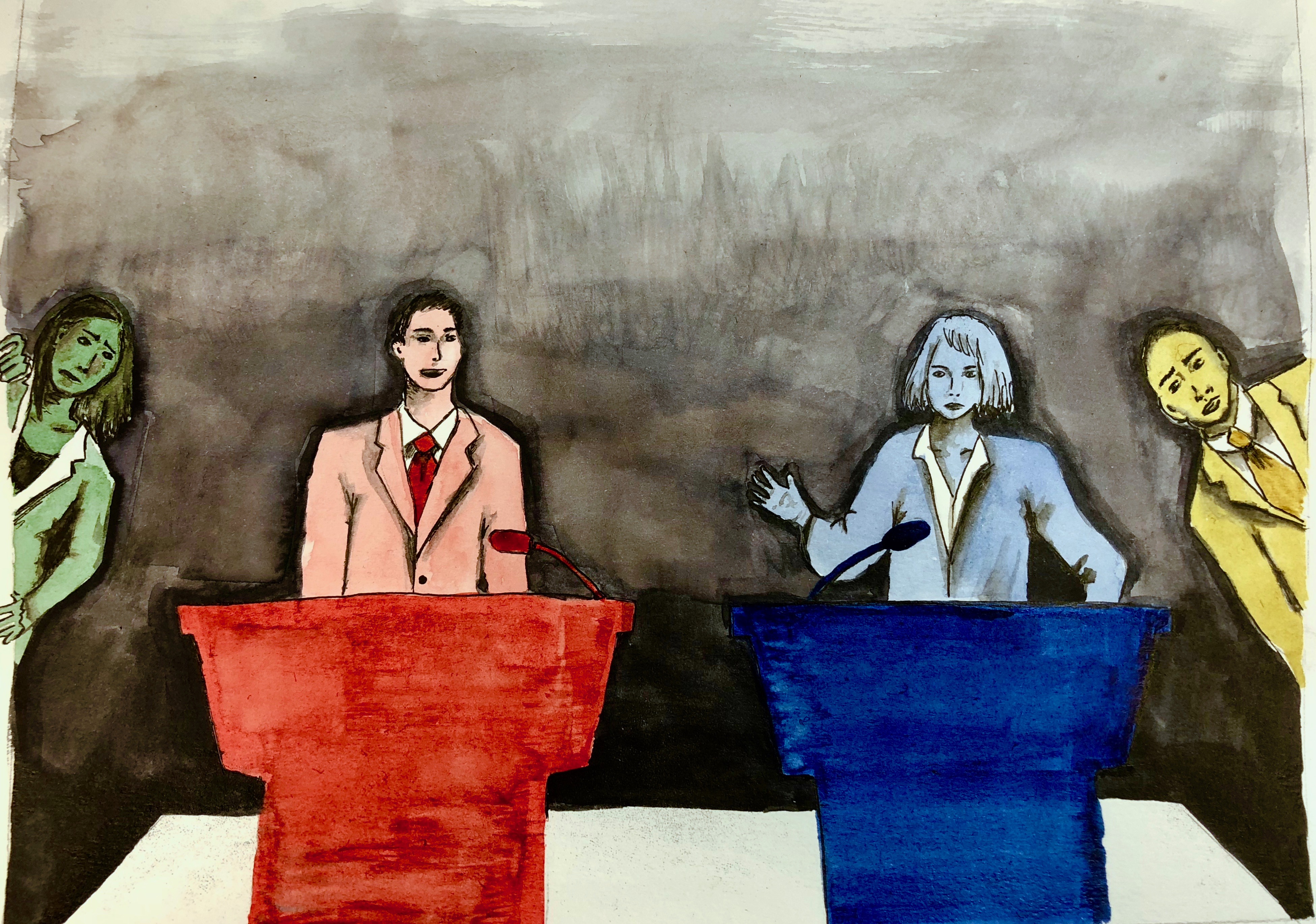Cade Mallett: Mainstream political student groups ignore third-party perspectives

(Hanna Rashidi/Daily Bruin)
By Cade Mallett
Feb. 14, 2018 1:21 a.m.
Barely a third of Americans think that two political parties are enough to represent the American people.
But if the Bruin Republicans and Bruin Democrats say they’re enough, well, that’s good enough for UCLA.
The 2016 Presidential election saw 8 percent of voters aged 18 to 29 vote for third-party or independent candidates, even though these candidates received only 4.9 percent of the popular vote. Younger people have increasingly turned to third-party or independent candidates, to the point where the Pew Research Center found that a larger fraction of millennials identify as independent than in any other generation in the center’s polling history. It’s not hard to see why, especially in 2016, when the major parties put forward historically weak candidates on issues like housing and education, which are of particular importance to young Americans.
At UCLA, support for the kind of political free-thinking afforded through support for third-party and independent candidates is sorely lacking. The university only has two major political student organizations: Bruin Democrats and Bruin Republicans, groups whose Facebook pages have 1,535 and 1,728 followers respectively. Besides that, it has the Bruin Political Union, a nonpartisan group which aims to increase the level of political discourse on campus.
Consequently, these organizations leverage their positions of popularity to exclude the views of third parties from political dialogues. For example, the BPU hosted CrossFire in November, a debate between members of Bruin Democrats and Bruin Republicans. Left out of the political discourse: student groups with third-party or independent leanings.
Major student political groups should engage more with third parties by including them in debates and political forums on campus. Otherwise, they risk warping student perspectives to fit a binary party system which may not reflect students’ true opinions.
At UCLA, the student groups affiliated with major political parties tend to ignore independent opinions, leaving many student voters who don’t identify with them without a group that represents their beliefs. Stephen Sands, a fourth-year economics student who identifies as a libertarian, said he feels he has no outlet to express his political opinions on campus. He said he feels that views that don’t follow the major party lines are not encouraged on college campuses, which are often left-leaning.
Filipp Krasovsky, a fourth-year economics student and libertarian, said he thinks libertarian viewpoints are systematically excluded from political discourse on campus.
“It feels the system is fixed against us somehow,” Krasovsky said. “Libertarians don’t get any representation on campus.”
The lack of representation is disenfranchising. Students with perspectives that don’t land directly in the camp of either major party don’t have an outlet, and consequently, don’t have room to grow or express themselves freely. Instead, they face the perverse incentive to compromise many of their positions to align themselves with one of the two major parties.
Henry DeGroot, a fourth-year political science and international development studies student and member of Socialist Students UCLA, said while he thinks third-party political groups don’t always need to be included by major political party groups to get a student following, he thinks the campus’ major political organizations can easily address lack of representation of third-party political groups by incorporating them in their events and debates. If the rest of campus isn’t willing to engage with these politics in friendly policy debates or co-programming efforts, it’s prohibitively difficult for them to gain ground in the mainstream.
Encouraging diverse political perspectives in college is essential because universities are meant to be spaces for people to identify their political inclinations. A significant portion of Americans don’t vote for a third party either because they don’t know these third parties exist or don’t think they will succeed. This makes the inclusion of third parties all the more important on college campuses, where students are encouraged to identify the nuances of their beliefs and values, and determine which political parties best align with them.
Yet, inclusion isn’t what we see from the representatives of the major parties at UCLA. Instead, it’s as if groups such as the Bruin Republicans and Bruin Democrats find it more convenient to ignore differing political opinions, forcing students into the same false dichotomy of political opinions that exists in the larger sphere of American politics, rather than prioritizing the engagement and discourse they claim to value so highly.
This could be as easy as including these parties in the annual debate between the major parties or even hosting separate debates with third-party and independent student organizations, such as the Bruin Libertarians and Socialist Students UCLA. The responsibility for this lies with everyone. The Bruin Republicans and Bruin Democrats need to be accepting of third parties, just as the third parties need to be reaching out for engagement. Nonpartisan organizations like BPU need to make sure they invite third parties to their events and debates as well.
“I think having debates is productive because it allows people to challenge the idea that there are only two perspectives,” DeGroot said.
Bruin Democrats and Bruin Republicans could not be reached for comment.
To be fair, parties certainly have the prerogative to recruit for themselves. But especially on college campuses, that should never come at the cost of preventing third parties from being seen in the first place, ignoring third-party perspectives and limiting the opportunities third parties have to engage with the members of the student body who are interested in politics. On top of that, it would only reflect positively on the major party organizations to participate in more debates with third parties to dispel any perception of close-mindedness.
Even if no minds are changed, showing a spectrum of political opinions is something we can’t afford to omit from the college experience.
Among young people, the votes for third parties are already there. UCLA’s political organizations need to engage with ideas, not stuff them under the mattress.


